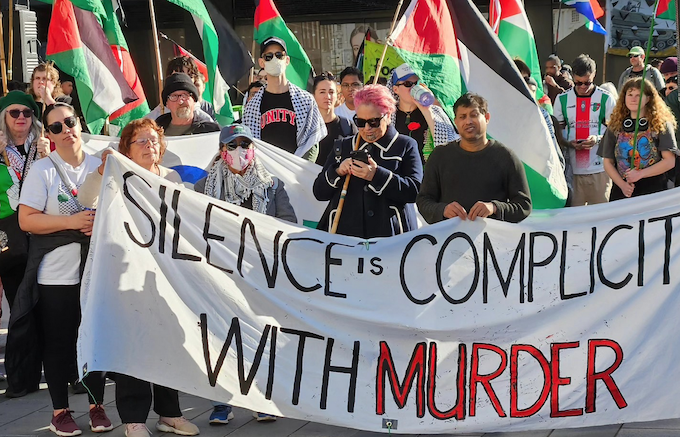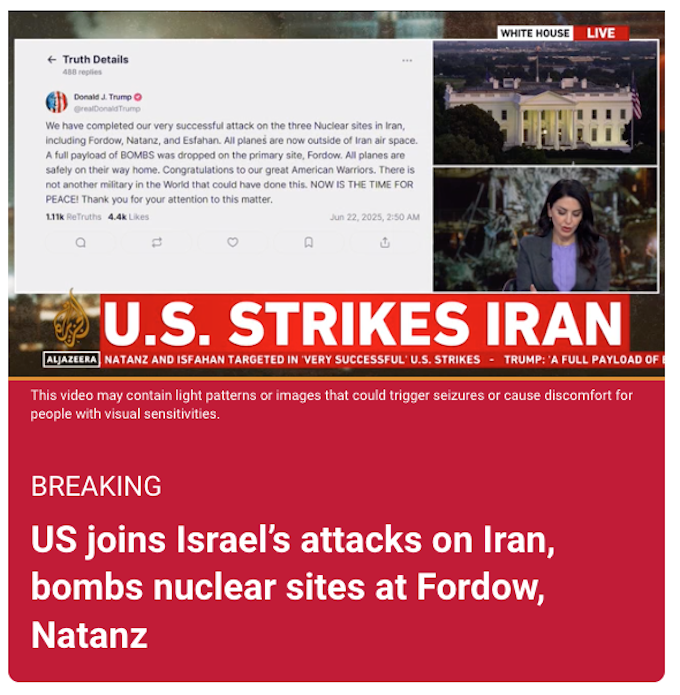
The US-Israeli attack against Iran will intensify the forces that are already destroying international law legacies and the UN system in the Middle East and most of the world, writes Rami Khouri.
ANALYSIS: By Rami G. Khouri
Israel’s attacks on military, civilian, and infrastructural sites throughout Iran and the repeated Iranian retaliatory attacks against targets across Israel have rattled the existing power balance across the Middle East — but the grave consequences of this new war for the region and the world’s energy supplies and economies will only be clarified in the weeks ahead.
It is already clear that Israel’s surprise attack did not achieve a knock-out blow to Iran’s nuclear sector, its military assets, or its ruling regime, while Iran’s consecutive days of rocket and drone attacks suggest that this war could go on for weeks or longer.
The media and public political sphere are overloaded now with propaganda and wishful thinking from both sides, which makes it difficult to discern the war’s outcomes and impacts.
- READ MORE: Trump says US has bombed Iran’s Fordow, Isfahan, Natanz nuclear sites – and warns against retaliation
- Other Middle East reports
For now, we can only expect the fighting to persist for weeks or more, and for key installations in both countries to be attacked, like Israel’s Defence Ministry and Weitzman Institute were a few days ago, along with nuclear facilities, airports, military assets, and oil production facilities in Iran.
So, interested observers should remain humble and patient, as unfolding events factually clarify critical dimensions of this conflict that have long been dominated by propaganda, wishful thinking, muscle-flexing, strategic deception, and supra-nationalist ideological fantasies.
This is especially relevant because of the nature of the war that has already been revealed by the attacks of the past week, alongside military and political actions for and against the US-Israeli genocide and ethnic cleansing aims in Palestine.
This round of US-Israel and Iran fighting has triggered global reactions that show this to be yet another battle between Western imperial/colonial powers and those in the Middle East and the Global South that resist this centuries-old onslaught of control, subjugation, and mayhem.
Identifying critical dimensions
We cannot know today what this war will lead to, but we can identify some critical dimensions that we should closely monitor as the battles unfold. Here are the ones that strike me as the most significant.
First off, the ongoing attacks by Iran and Israel will clarify their respective offensive and defensive capabilities, especially in terms of missiles, drones, and the available defences against them.
Iran has anticipated such an Israeli attack for at least a decade, so we should assume it has also planned many counterattacks, while fortifying its key military and nuclear research facilities and duplicating the most important ones that might be destroyed or damaged.
Second, we will quickly discover the real US role in this war, though it is fair already to see Israel’s attack as a joint US-Israeli effort.
This is because of Washington’s almost total responsibility to fund, equip, maintain, resupply, and protect the Israeli armed forces; how it protects Israel at the UN, ICC, and other fora; and both countries’ shared political goals to bring down the Islamic Republic and replace it with a puppet regime that is subservient to Israeli-US priorities.
Trump claims this is not his war, but Israel’s attacks against Iran, Palestine, Syria, Yemen, Iraq, and Lebanon can only happen because of the US commitment by law to Israeli military superiority in the Middle East. The entire Middle East and much of the world see this as a war between the US, Israel, and Iran.
And then today the US strikes on the three Iranian nuclear facilities at Fordow, Natanz, and Isfahan.

Unconventional warfare attacks
We will also soon learn what non-military weapons each side can use to weaken the other. Missiles and drones are a start, but we should expect unconventional warfare attacks against civilian, infrastructural, digital, and financial sector targets that make life difficult for all.
An important factor that will only become clear with time is how this conflict impacts domestic politics in both countries; Iran and Israel each suffer deep internal fissures and some discontent with their regimes. How the war evolves could fragment and weaken either country, or unite their home citizenries.
Also important will be how Arab leaders react to events, especially those who chose to develop much closer financial, commercial, and defence ties with the US, as we saw during Trump’s Gulf visit last month. Some Arab leaders have also sought closer, good neighbourly relations with Iran in the last three years, while a few moved closer to Israel at the same time.
Arab leaders and governments that choose the US and Israel as their primary allies, especially in the security realm, while the attacks on Gaza and Iran go on, will generate anger and opposition by many of their people; this will require the governments to become more autocratic, which will only worsen the legacy of modern Arab autocrats who ignore their people’s rights and wellbeing.
Arab governments mostly rolled over and played dead during the US-Israeli Gaza genocide, but in this case, they might not have the same opportunity to remain fickle in the face of another aggressive moral depravity and emerge unscathed when it is over.
If Washington gets more directly involved in defending Israel, we are likely to see a response from voters in the US, especially among Trump supporters who don’t want the US to get into more forever wars.
Support for Israel is already steadily declining in the US, and might drop even faster with Washington now engaging directly in fighting Iran, because the Israeli-US attack is already based on a lie about Iran’s nuclear weapons, and American popular opinion is increasingly critical of Israel’s Gaza genocide.
Iran’s allies tested
The extent and capabilities of Iran’s allies across the Middle East will, too, be tested in the coming weeks, especially Hezbollah, Hamas, Ansar Allah in Yemen, and Popular Mobilisation Forces in Iraq. They have all been weakened recently by Israeli-American attacks, and both their will and ability to support Iran are unclear.
Israeli Prime Minister Benjamin Netanyahu sees this attack as the last step in his strategy to reorganise and re-engineer the Middle East, to make all states dependent on Israeli approval of their strategic policies. A few already are.
Netanyahu has been planning this regional project for over a decade, including removing Saddam Hussein, weakening Hezbollah and Hamas, hitting Yemen, and controlling trends inside Syria now that Bashar al-Assad is gone.
We will find out in due course if this strategy will rearrange Arab-Middle East dynamics, or internal Israeli-American ones.
The cost of this war to Israeli citizens is a big unknown, but a critical one. Israelis now know what it feels like in Southern Lebanon or Gaza. Millions of Israelis have been displaced, emigrated, or are sheltering in bunkers and safe rooms.
This is not why the State of Israel was created, according to Zionist views, which sought a place where Jews could escape the racism and pogroms they suffered in Europe and North America from the 19th Century onwards.
Most dangerous place
Instead, Israel is the most dangerous place for Jews in the world today.
This follows two decades in which all the Arabs, including Palestinians and Hamas, have expressed their willingness to coexist in peace with Israel, if Israel accepts the Palestinians’ right to national self-determination and pertinent UN resolutions that seek to guarantee the security and legitimacy of both Israeli and Palestinian states.
The US-Israeli attack against Iran will intensify the forces that are already destroying international law legacies and the UN system in the Middle East and most of the world. The US-Israel pursue this centuries-old Western colonial-imperial action to deny indigenous people their national rights at a time when they have already ignored the global anti-genocide convention by destroying life and systems that allow life to exist in Gaza.
Rami G Khouri is a distinguished fellow at the American University of Beirut and a nonresident senior fellow at the Arab Center Washington. He is a journalist and book author with 50 years of experience covering the Middle East. Dr Khouri can be followed on Twitter @ramikhouri This article was first published by The New Arab before the US strikes on Iran.













































